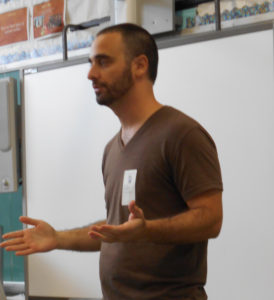In late June, We Are Not Your Soldiers published a report describing in detail the accomplishments of We Are Not Your Soldiers during the 2017-18 school year as well as our goals for the coming year. Please take a look. When that report went out, Nick Mottern, a member of World Can’t Wait’s Advisory Board had additional questions about We Are Not Your Soldiers which we have posted with answers from project coordinator, Stephanie Rugoff. Please read below.
How does one go about getting into a school classroom?
We are invited by the teacher or professor or by the principal or assistant principal. This generally comes about either by word of mouth – such as one colleague suggesting us to another; by meeting educators at conferences; and by seeking invitations by announcements on various websites, social media, organizational email lists (such as the material World Can’t Wait sends out) or listserves catering to educators; by calling, emailing or visiting school administrators requesting possible visits to their schools. It takes persistent work to do this with a lot of follow-up.
Have teachers ever tried to play down or shut down what you are presenting?
Most teachers invite us because they care about their students, and the world, and want to present the dangers of joining the U.S. military at this time, especially against the hard-sell of the military recruiters. Having veterans who have lived through wars of aggression, and are willing to talk truthfully about their experiences, is a bonus for them.
Not everyone who invites us, though, is in agreement with our point of view. However, they – whether teachers or administrators – feel that students should have the opportunity to hear both sides of the issue about the role of the military and the nature of what military service entails. They believe in critical thinking and the ability of students to hear varying opinions, do research and come to their own conclusions. Sometimes, if a teacher is selected by an administrator to have our presentation in his or her class and is not enthused about the visit, then he or she doesn’t prep the students (either for or against) and the discussion doesn’t flow as well because the students don’t have the context or background information with which to integrate what we’re presenting. We once had a situation, not New York City, where there was a dispute among the high school faculty and some teachers disrupted a presentation during an assembly. We were told we couldn’t return to that school. We had one school where a parent protested the visit (other interactions with any parents in high schools, which are rare, have been positive).
Do your speakers talk to the students about the historic pattern of U.S. colonialism, enforced by the military, as an explanation for why we are at war? Smedley Butler would be a poster child for the imperial enforcer who woke up and spoke out.
Yes, we do speak about U.S. war history. Each veteran has his own views, and has done his own study. We share our view as World Can’t Wait, that humanity and the planet come first and that nothing good can come of U.S. intervention anywhere in the world, especially now, when there is the most serious threat of U.S. aggression by the “America First” Trump/Pence regime.
And yes, we include a quote from Smedley Butler on our Resources page for teachers.
Can you summarize students’ reaction to the information you present on colonialism and wars? What connection is there to activism? Is there any larger meaning for effective messaging to students and the public in general?
Student reaction to the history of US wars, the brutality of current wars and the inhumanity of much of what goes on in the military is generally one of dismay. Students are often surprised at the reality we present, as they didn’t realize how awful much of this is. Most are unaware of the military acts being carried out in their names. For the most part, most of the students are clear that they don’t want to be part of this (although a few, often thoughtful young people, do want to enlist and see for themselves).
However, we have found that – just as in the general public – there is a broad gulf between the realization and rejection of what’s involved in these U.S. wars and any conviction that they have or should have any agency in changing what is being carried out. So, just as in all our activist work, I think there are at least two parts to what we do. The first is informational – creating the knowledge or awareness of just what is going on. The second is agitating or organizing for active opposition, for creating an enormous visible public opposition.
We are always ready to go if students express interest in taking action. Doing so is something we certainly try to introduce as an option, put it out there as something to consider.

